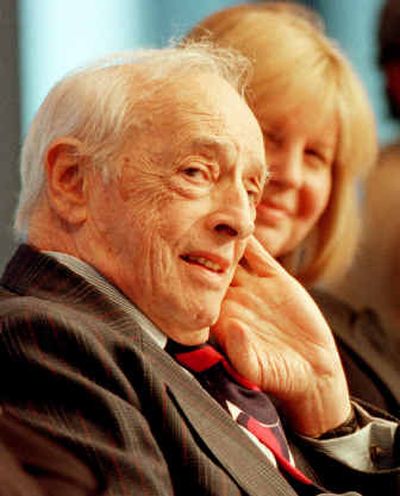Acclaimed author Saul Bellow dies

NEW YORK – Nobel laureate Saul Bellow, a master of comic melancholy who in “Herzog,” “Humboldt’s Gift” and other novels both championed and mourned the soul’s fate in the modern world, died Tuesday. He was 89.
Bellow’s close friend and attorney, Walter Pozen, said the writer had been in declining health, but was “wonderfully sharp to the end.” Pozen said that Bellow’s wife and daughter were at his side when he died at his home in Brookline, Mass.
Bellow was the most acclaimed of a generation of Jewish writers who emerged after World War II, among them Bernard Malamud, Philip Roth and Cynthia Ozick. To American letters, he brought the immigrant’s hustle, the bookworm’s brains and the high-minded notions of the born romantic.
“The backbone of 20th-century American literature has been provided by two novelists – William Faulkner and Saul Bellow,” Philip Roth said in a statement Tuesday. “Together they are the Melville, Hawthorne, and Twain of the 20th century.”
He was the first writer to win the National Book Award three times: in 1954 for “The Adventures of Augie March,” in 1965 for “Herzog” and in 1971 for “Mr. Sammler’s Planet.” In 1976, he won the Pulitzer Prize for “Humboldt’s Gift.” That same year,` Bellow was awarded the Nobel Prize in literature, cited for his “human understanding and subtle analysis of contemporary culture.” In 2003, the Library of America paid the rare tribute of releasing work by a living writer, issuing a volume of Bellow’s early novels.
“If the soul is the mind at its purest, best, clearest, busiest, profoundest,” Ozick wrote in 1984, “then Bellow’s charge has been to restore the soul to American literature.”
In spite, or perhaps because, of all the praise, Bellow also had detractors. Norman Mailer called “Augie March” a “travelogue for timid intellectuals.” Critic Alfred Kazin, a longtime friend who became estranged from Bellow, thought the author had become a “university intellectual” with “contempt for the lower orders.” Biographer James Atlas accused Bellow of favoring “subservient women in order to serve his own shaky self-image.”
Old-fashioned, but not complacent, the author strove to ward off the “Nobel curse,” not to be softened by literature’s highest honor. He kept writing into his 80s and, hoping to make his work more affordable, had his novella “A Theft” published as a paperback original in 1989.
His recent works included “The Actual,” a sentimental novella published in 1997, and “Ravelstein,” a 2000 novel based on the life of his late friend, Allan Bloom, author of “The Closing of the American Mind.” Also in 2000, Bellow was the subject of Atlas’ acclaimed biography.
Bellow had a gift for describing faces, and the author’s own looks – snowy hair, aristocratic nose and space between his front teeth – were familiar from book jackets. His personality was equally distinctive. In “Humboldt’s Gift,” the narrator’s childhood sweetheart refers to him as a “good man who’s led a cranky life.” His longtime agent, Harriet Wasserman, once described him as being as “deeply emotional as he is highly intellectual and cerebral.”
He had five wives, three sons and, at age 84, a daughter. He met presidents (Kennedy, Johnson) and movie stars (Marilyn Monroe, Jack Nicholson). He feuded with writers (Truman Capote, Mailer), and helped out others, notably William Kennedy, on whose behalf he lobbied to get his work published.
Like his characters, Bellow’s life was an evolution from the unbearable but comic passion of the Old World to the unbearable but comic alienation of the New World.
The son of Russian immigrants, he was born Solomon Bellows in 1915 in Lachine, Quebec, outside Montreal. He dropped the final “s” from his last name and changed his first name to Saul when he began publishing his writing in the 1940s.
When he was 9, his family moved from Montreal to Chicago. Bellow learned Hebrew and Yiddish as a young man, and the Old Testament was a living text. His family life was one of violence (his father), of sentiment (both parents) and of humor (everyone). Nothing was left unsaid.
The classic Bellow narrator was a self-absorbed intellectual with ideals the author himself seemed to form during the Depression. While he would remember the fear most people had during those years, Bellow found them an exciting and even liberating time.
“There were people going to libraries and reading books,” he told the Associated Press in a 1997 interview. “They were going to libraries because they were trying to keep warm; they had no heat in their houses. There was a great deal of mental energy in those days, of very appealing sorts. Working stiffs were having ideas.”
Bellow will have a private funeral, said Pozen. A public memorial is also planned.